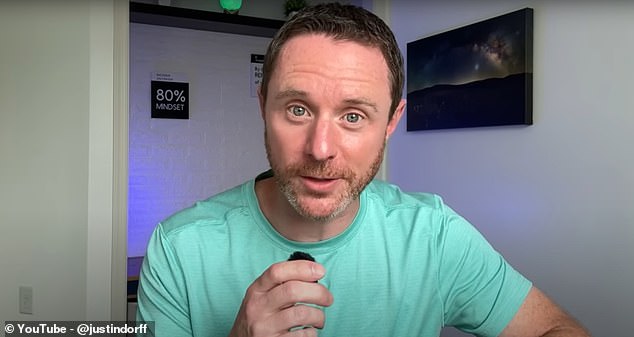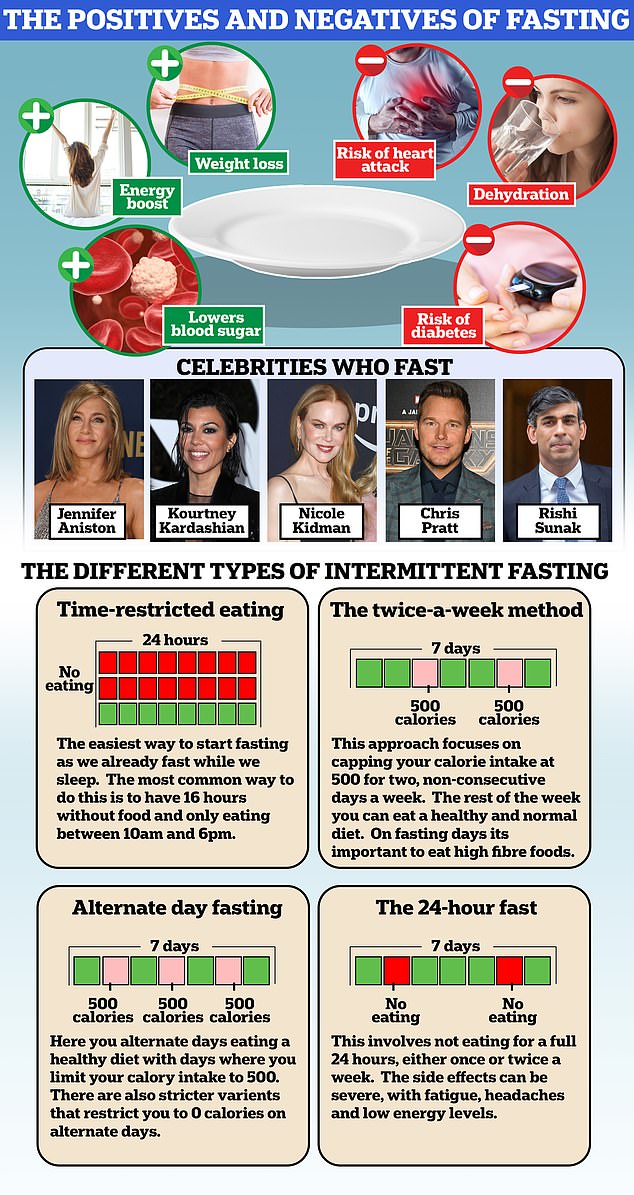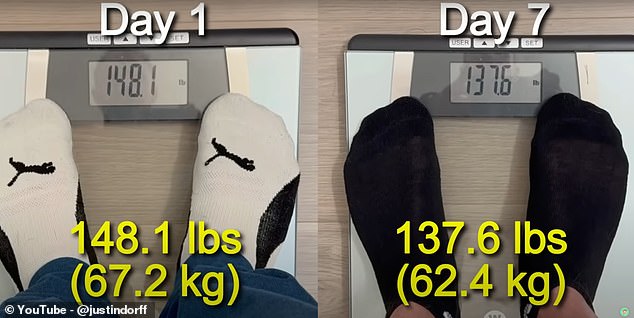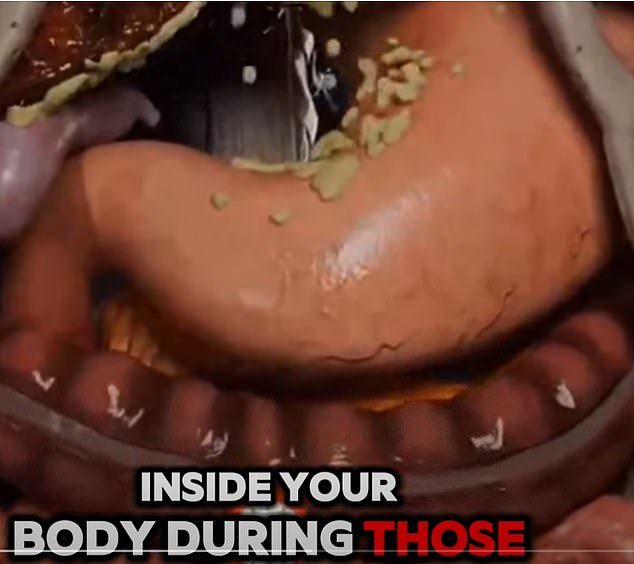A social media star who undertook a two week fast has revealed the brutal impact the challenge had on his body.
Justin Dorff has earned a 24,000 strong YouTube following by taking on increasingly elaborate health and fitness challenges, including testing out longevity guru Bryan Johnson’s $2million anti-ageing routine and eating nothing but eggs or butter for 72 hours.
But the 42-year-old health coach embarked on a new feat, drinking only water and not consuming food for seven days.
The Pennsylvania based influencer and entrepreneur was already fit and healthy, weighing around 148.1lbs (67.2kg)—and waist circumference of 32in (81.3cm).
Now, in a recent YouTube video, which was been viewed almost 100,000 times, he told how the challenge shockingly had a ‘God mode’ effect on his body.
After suffering four ‘fantastically rough’ days ‘feeling hollow’, on the fifth day he awoke with ‘tons of energy’ and ‘crushed’ his workouts.
The week-long feat, instead, gave him the ‘opportunity to reset the body, mind, and spirit’.
Despite swathes of studies suggesting intermittent fasting—which shot to prominence in the early 2010s—does work, experts remain divided over its effectiveness and the potential long term health impacts.

Justin Dorff has earned a 24,000 strong YouTube following by taking on increasingly elaborate health and fitness challenges, including testing out longevity guru Bryan Johnson’s $2million anti-ageing routine and eating nothing but eggs or butter for 72 hours

Jennifer Aniston, Chris Pratt and Kourtney Kardashian are among the Hollywood A-listers to have jumped on the trend since it shot to prominence in the early 2010s. But, despite swathes of studies suggesting it works, experts have remained divided over its effectiveness and the potential long term health impacts
Some argue that fasters usually end up consuming a relatively large amount of food in one go, meaning they don’t cut back on their calories—a known way of beating the bulge.
They even warn that it may raise the risk of strokes, heart attacks or early death.
Scientists have also urged caution over fasts that last more than a day because of their ‘short-lived’ effectiveness, advising that they could trigger chronic health issues like digestive conditions.
Mr Dorff said: ‘For the past two months, I’ve been feeling tired. I’ve got nagging injuries. I’ve got this low-level stress. I crave junk food. I feel kind of sad and not really myself.’
To combat this, he said he would be tracking his mood, ‘cravings, hunger, and energy’ throughout the seven day fast, which he dubbed the Great Reset.
The first 20 hours were ‘fairly normal’, while ‘nothing really dramatic’ occurred, he added.
He had ‘no real cravings not much hunger, plenty of energy.’
During this time, it is believed that the body burns through its stored glucose called glycogen and once that runs out, you start burning body fat.

By the end of the challenge, he had lost over 10lbs and 10.5in around his waist, while his cravings for junk food disappeared
It was only on day two that the challenge became far more difficult.
‘I felt tired, foggy headed, kind of nauseated,’ he said.
In an effort to cope with such symptoms, he took multivitamin tablets, electrolyte capsules and salt water—specifically to combat the headaches.
‘But my motivation and energy quickly disappeared,’ he noted.
‘My goal was to reset my mind and my body but I feel rundown, physically and mentally. I’m trying to distract myself and keep busy until bedtime.’
Days three and four were also ‘fantastically rough’.
‘I woke up feeling hollow, like someone scooped out my insides, and I’m just withering away. Also, my hands and feet were cold and white,’ Mr Dorff said.
‘I drank an absurd amount of salt water, and spent an hour just staring out the window.

It comes as an illuminating video posted online in May garnered thousands of views for its alarming display of exactly what happens to the body—hour by hour—when fasting
‘The evenings were brutal, hunger and cravings were at their highest, energy and mood were at their lowest.’
On day five, however, Mr Dorff told how ‘everything changed overnight’, switching from ‘zombie to God mode’.
By day six he had lost over seven lbs, dropping from 148.1lbs (67.2kg) to 139.6lbs (63.3kg).
‘But more important than the physical results was how I felt,’ he added.
‘I wasn’t white knuckling it through hunger and cravings. I had tons of energy and crushed my workouts. I could focus, waking up however was difficult.’
By the end of the challenge, he had lost over 10lbs and 10.5in around his waist, while his cravings for junk food disappeared.
It comes as an illuminating video posted online in May garnered thousands of views for its alarming display of exactly what happens to the body—hour by hour—when fasting.
The four-minute gut-wrenching simulation claimed the body stops digesting food after just four hours, entering what is known as the catabolic phase—when muscle and fat is used for energy.
By 12 hours, it has hit a ‘fasted state’ depleted of blood sugar. Here, the liver begins to break down stored fat into fatty acids called ketones to use as fuel.
But ketones can be dangerous—high levels of them in the blood can lead to a condition called ketoacidosis, when blood becomes too acidic. If not treated promptly it can be life-threatening.
Studies have also found that prolonged exposure to ketones can be detrimental to the heart, increasing the risk of heart attacks and strokes.
Fasting up to 16 hours can then stimulate autophagy— where cells break down and remove damaged or unnecessary components like old proteins—it is claimed.
Research has long warned, however, that excessive or prolonged autophagy can lead to cell death, potentially harming organs.











